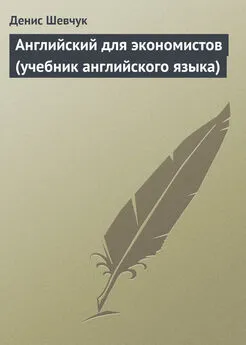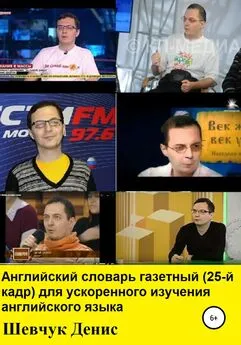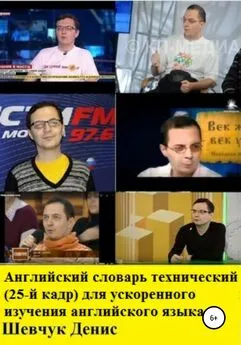Денис Шевчук - Английский язык: самоучитель
- Название:Английский язык: самоучитель
- Автор:
- Жанр:
- Издательство:неизвестно
- Год:неизвестен
- ISBN:нет данных
- Рейтинг:
- Избранное:Добавить в избранное
-
Отзывы:
-
Ваша оценка:
Денис Шевчук - Английский язык: самоучитель краткое содержание
Книга предназначена для всех желающих быстро освоить английский язык. Она может быть полезна поступающим в вузы (абитуриентам), студентам, преподавателям, бизнесменам, туристам и всем, имеющим контакты с зарубежными партнерами. Она может быть полезна как начинающим, так и продолжающим изучать английский язык.
Также даются полезные советы для прохождения интервью при приеме на работу.
Пособие разработано на базе многолетней практики преподавания английского языка по методике дистанционного образования. С его помощью можно получить достаточные знания и навыки для адекватного поведения в различных ситуациях бытового и делового общения. Active Vocabulary - новые слова и выражения урока, речевые образцы и их детальная отработка; Active Grammar - объяснение грамматики урока и упражнения на отработку данных грамматических явлений с использованием новой лексики урока; Reading and Speaking Practice - упражнения, нацеленные на отработку навыков чтения и говорения с использованием изученной лексики и грамматики; Assignment - письменное задание, составленное в форме теста. Материал уроков систематизирован по темам, названия которых приводятся в начале каждого урока. Одним из достоинствпособия является постоянная систематизация изучаемой лексики и грамматики, что позволяет максимально облегчить процесс обучения. Для повышения эффективности обучения рекомендуем выполнять упражнения, проговаривая их вслух, пересказывая все тексты и диалоги. Старайтесь произносить слова, фразы и диалоги громко, обращая особенное внимание на интонацию. При необходимости используйте компьютерные словари, дающие правильные варианты произношения слов, а также много слушайте аудио и видеозаписи, вообще голос носителей.
Английский язык: самоучитель - читать онлайн бесплатно ознакомительный отрывок
Интервал:
Закладка:
3. He has received lots of medals. Besides,...............................................................
4. In comparison with her feelings.........................................................................
5. My shoes are too tight. However,.......................................................................
6. In spite of the fact that she worries about me,.........................................................
7. He has just cut his fingers. We should..................................................................
8. What’s the matter? We have just........................................................................
9. His wallet is rectangular, but mine......................................................................
10. His friends have always supported me, but hers.....................................................
4. Read the dialogue and fill in the missing information.
Прочитайте диалог и добавьте необходимую по смыслу информацию .
Julia: James, what are you doing?
James: I’m measuring my desk?
Julia: Why?
James: .................................................................................
Julia: And how big is your desk?
James: .................................................................................
Julia: And the one in the catalogue you are going to buy?
James: .................................................................................
Julia: What’s it made of?
James: .................................................................................
Julia: What’s it like?
James: .................................................................................
Well, have a look at it. What do you think of it?
Julia: ...................................................................................
James: Yes, I quite agree.
5. Write in the missing words. Then learn the dialogue.
Дополните диалог словами по смыслу. Выучите его .
Has, matter, look out, be careful, better, get up, headache, careful, broken, worry, fell, hospital, doesn’t, feel, hurts, gone, stomachache
Mother: Come on, John. Time to ....................................
Son: I don’t..............................well.
Mother: Oh, dear. What’s the................................?
Son: I have a................................. And my arm........................... And I have ............................... .................................., Mum! Be......................... Don’t sit there.
Mother: Why not?
Son: I..........................out of bed last night. I’ve.......................my leg, I think.
Mother: Oh, dear. You should go to.....................................
Son: No, I’ll be all right. But I can’t go to school today.
Mother: Don’t........................... John. You can stay in bed all day. Today is Saturday. There is no school today................................., John!
Son: It’s all right, Mum. My headache....................gone. My arm........................hurt. My stomachache has.......................... And my leg is........................... I think I’ll get up now.
6. Read the dialogue and try to learn it.
Прочитайте диалог и постарайтесь его запомнить .
Rachel: I’ve done it! I’ve done it!
Julia: What is it?
Rachel: I have just won a holiday. For two. To Italy!
Julia: Rachel, look out!.......Are you all right? Are you OK?
Rachel: I don’t know. I’ve broken my leg, I think.
Julia: Now, don’t worry. Which leg is it?
Rachel: This one.
Julia: And where does it hurt?
Rachel: There.
Tom: What has happened?
Julia: It’s Rachel. She has hurt herself. Has she broken anything?
Tom: I’m not sure. I don’t think so. But don’t move her. She should go to hospital. I’ll call an ambulance.
(after an hour) Rachel has hurt her leg but she hasn’t broken it.
7. Read this text.
Прочитайте текст .
A Dance Class
Mary Evelin teaches dancing in the London School of contemporary dance. She is very much interested in studying the human body and the way it moves. It is relatively difficult as it takes a lot of her time and energy. The majority of her students have already won lots of prizes in their dancing career.
Mary has always loved to watch dancing. She finds it fascinating because it is something which crosses all barriers. It is often called the language of dance. It is a way of communicating emotion or feelings, stories without having to use words.
She thinks that strength is very important to the dancer and stamina. Dancers have a lot of work to do in order to make their body mobile. That’s to make the arms, the legs, the head move freely, and to have control over the different parts of the body. Isolation in dance is very important. It is crucial that the dancer learns to use all the different parts of the body in separation from each other. So that, for instance when the whole of the body is still, they could move just a hand from the wrist, or just a head, just a shoulder. Each part of the body must be mobile.
A. Retell the text.
Перескажите текст.
B. Complete the sentences.
Дополните предложения.
In spite of the fact that Mary likes dancing, she......................................................
Dancing takes a lot of her time. Besides,...............................................................
In comparison with........................, dancing.....................................................
She is a very good teacher, as she.......................................................................
She has already practiced a lot, so she..................................................................
On the one hand, dancers have to make their body mobile, but on the other hand................
...............................................................................................................
Dancing is very difficult. But however,................................................................
C. Ask five questions about the text.
Задайте пять вопросов к тексту.
D. Answer the questions.
Ответьте на вопросы.
1. How does Mary study the human body?
2. Why does she love dancing?
3. Have her students become good dancers yet?
4. What is the language of dance?
5. What is very important for the dancer to be able to do?
6. Why is isolation in dance very important?
ASSIGNMENT 8
LESSON 8
Choose the correct word.
Выберите подходящее слово .
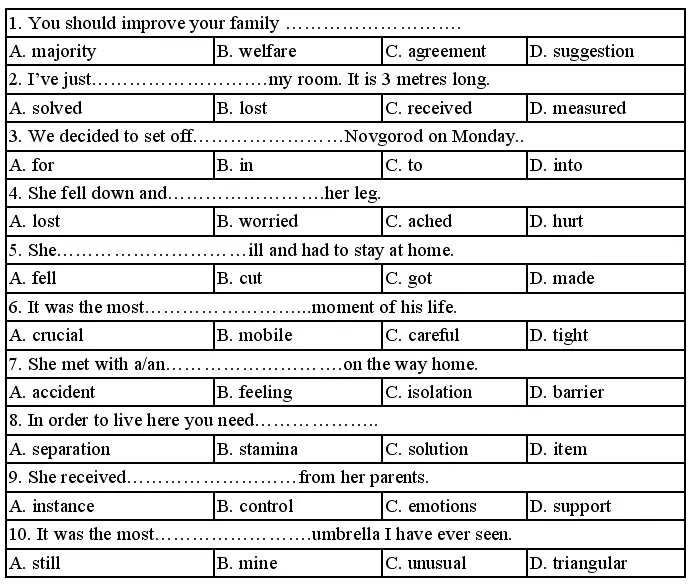
Find a mistake in each line. The first is done for you.
Найдите ошибку в каждой из строк. Первая строка дана как пример .
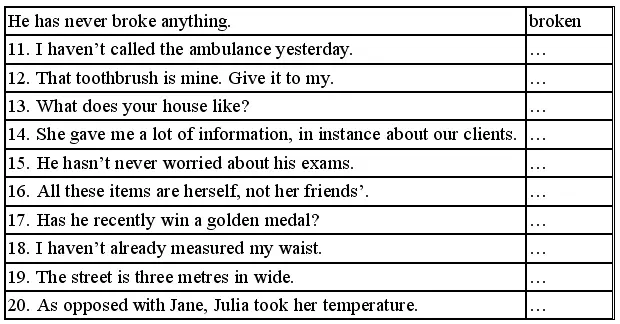
Translate the sentences.
Переведите предложения .

Choose the right question.
Выберите правильный вопрос .
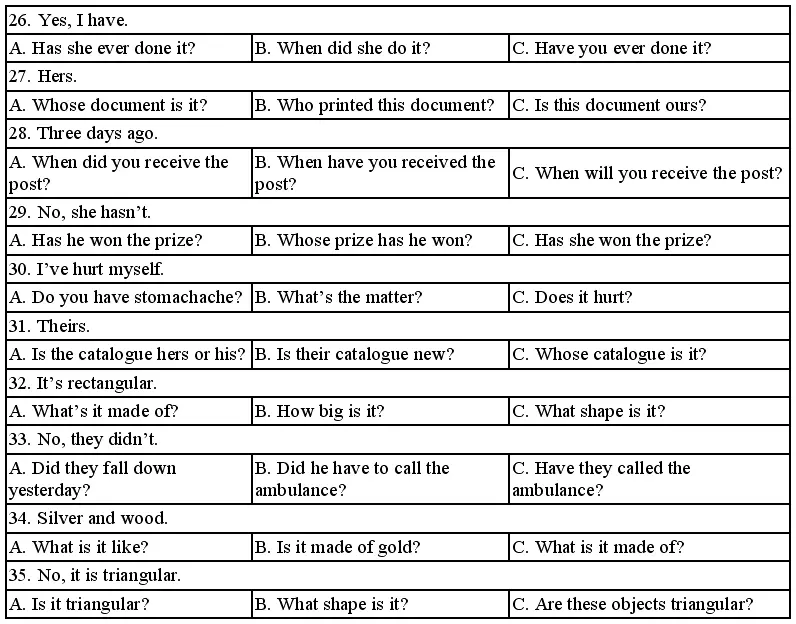
LESSON 9. Things going wrong

LEAD-IN
1. Answer the questions about yourself.
Напишите ответы на вопросы о себе .
1. Why do you sometimes have problems at work?
2. Who helps you to deal with problems at work?
3. Have you ever had to change jobs? Why?
4. Have you ever met with an accident?
5. Have you ever lost anything important?
6. What problems at home do you sometimes have?
7. How do you deal with these problems?
8. Why do we sometimes lose self-control when we deal with problems?
9. What do you feel when you are late?
10. Do you remember any serious problems you have had to deal with?
2. Say what you have done in your life and what you haven’t.
Скажите, чем Вы занимались в своей жизни, а чем – нет .
To have an accident, to lose a wallet, to repair cars, to live in Spain, to have a wife/husband, to win a holiday, to break a leg, to buy tight shoes, to live in the countryside, to be to the British Museum, to travel by canal boat, to stay in a hotel, deal with people from numerous walks of life, to receive a letter from Britain, to cut a finger, to call an ambulance.

3. Make up correct sentences.
Составьте предложения из данных слов .
1. never/he/communicated/foreigners/has/with.
.....................................................................................
2. you/ever/broken/leg/your/have?
......................................................................................
3. recently/have/I/had/call/an/to/ambulance.
......................................................................................
4. problems/you/ever/what/had/your/life/in/have?
.....................................................................................
5. a/Rita/won/holiday/two/to/Italy/has/just/for.
.....................................................................................
6. never/bought/made/gold/he/has/a/of/watch.
.......................................................................................
7. hasn’t/my/measured/her/pressure/grandmother/lately.
.....................................................................................
8. been/European/you/have/any/country/ever/to?
......................................................................................
4. Speak about your life. Use the verbs given. Use the adverbs given below.
Расскажите о своей жизни. Используйте данные глаголы. Используйте приведенные наречия .
Читать дальшеИнтервал:
Закладка:







